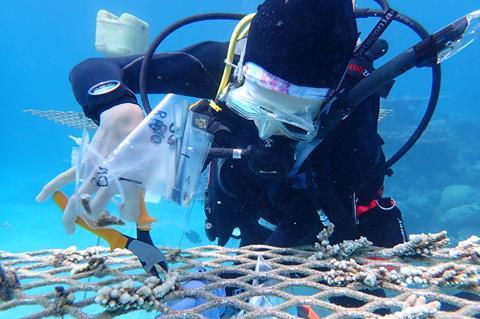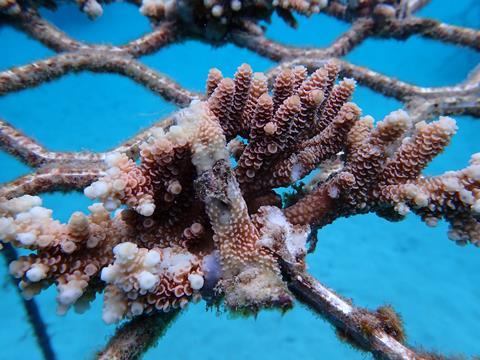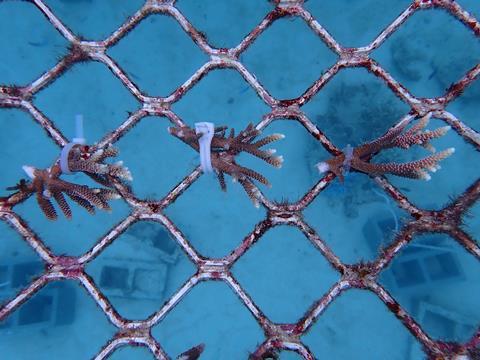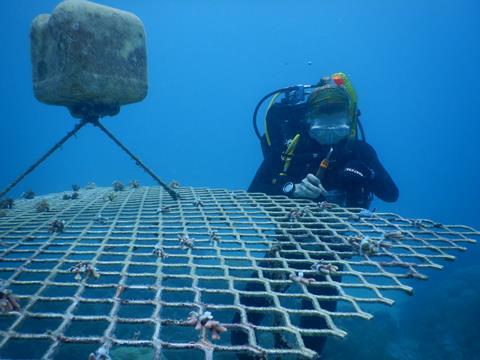Biodegradable plastic cable ties could be used to replace their conventional plastic equivalents in coral propagation as they perform as well and don’t adversely affect coral-associated bacterial communities as they break down.

That was the finding of a study by researchers at the University of Technology in Sydney who carried out a coral propagation experiment on the Great Barrier Reef.
The study, ‘Impacts of plastic-free materials on coral-associated bacterial communities during reef restoration’, recently appeared in Environmental Microbiology Reports, an Applied Microbiology International publication.
Biodegradable cable ties
Corresponding author, postdoctoral research associate Dr Paige Strudwick of the Future Reefs Research Group, explained: “We discovered that biodegradable plastics (used to secure corals) did not differentially impact the coral-associated bacterial communities during coral propagation on nursery structures on the northern Great Barrier Reef.

“This is an important discovery as plastic pollution continues to be a threat to the health of our oceans and reducing reliance on conventional plastics is essential, especially during efforts to protect coral reefs.”
Plastic debris in the ocean can generate micro- and macro-plastics which pose risks to coral reefs and endemic marine organisms, she said.
Microbial communities
“Specifically, microbial communities colonizing marine plastic debris (within the ‘plastisphere’) could impact coral microbiomes through direct contact or ingestion. We were simply aiming to determine whether plastic-free alternatives perform (retain coral) as well as conventional plastic cable ties and whether they detrimentally impact the coral-associated bacterial communities.

“Biodegradable materials are broken down through microbial processes and hence we wanted to confirm these materials did not have adverse impacts to the coral holobiont when they are used during propagation.”
To identify whether biodegradable materials differentially impact coral-associated bacterial communities, the team examined Acropora millepora coral-associated bacterial communities during propagation in two experiments on the Great Barrier Reef.
Great Barrier Reef
Coral fragments were secured to coral nurseries with conventional plastic, metal, or biodegradable (polyester and polycaprolactone) ties. Tie failure and coral-associated bacterial communities were then characterized over six months.
Minimal coral mortality was observed (3.6%–8%) and all ties had low failure rates (0%–4.2%) except for biodegradable polyester ties (29.2% failure). No differences were observed between coral-associated bacterial communities of fragments secured with different ties, and no proliferation of putatively pathogenic bacteria was recorded.
The low failure rate came as a surprise, Dr Strudwick said.
“We were unsure how long the biodegradable ties would take to degrade and thought that there would be a higher failure rate for those materials,” she said.
Next steps
“Prior to the widespread use and application of these findings, we need to test the materials with other coral growth forms, particularly slow growing corals where there is potential for the tie to degrade prior to the coral self attaching to the nursery structure. We plan to assess this in 2024.”

Dr Paige Strudwick led this study as part of her PhD thesis research, with support from co-authors Dr Emma Camp, Professor Justin Seymour, Professor David Suggett, Christine Roper, John Edmondson and Dr Lorna Howlett. Dr Caitlin Lawson, Amanda Grima and Jack Edmondson also assisted with the fieldwork.
‘Impacts of plastic-free materials on coral-associated bacterial communities during reef restoration’ appears in Environmental Microbiology Reports.







No comments yet